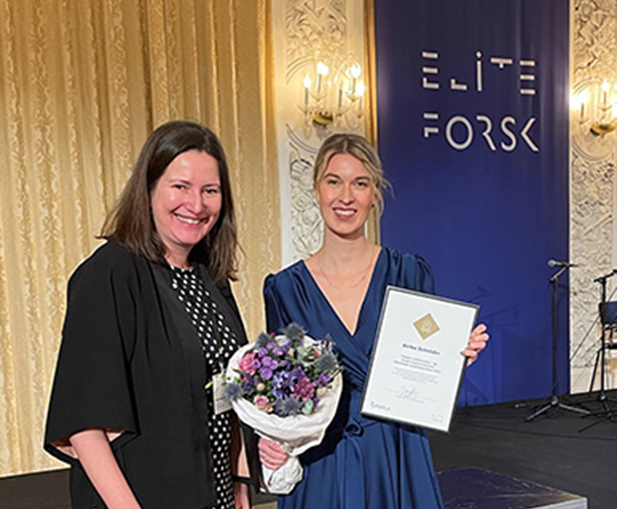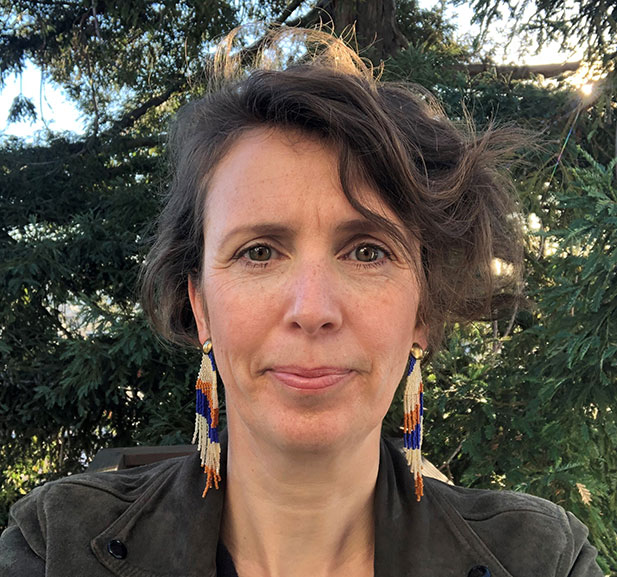Two CBS researchers receive Elite Research Travel Grants
Anika Schröder from the Department of Digitalization explains what her project is about:

My industrial PhD project concerns the green transformation of the agri-food industry. Not only is the agri-food industry a major contributor to climate change (one third of GHG-emissions), but there is also the risk that we may run out of topsoil, which is needed for 95% of our food production. Therefore, a change is called for. How this change might come about, is the subject I will investigate in my PhD project.
More specifically, my PhD project analyses how digital technologies and data can be used to further sustainability. My emphasis is on how digital ecosystems enable the green transition of industries with physical (perishable) goods. Thus, the project investigates how value chains are reconstructed and how these digital ecosystems enable value generation towards more sustainability.
My collaboration with the food and agricultural firm, FOSS Analytics, comes with the advantage of already established relationships to most stakeholders and various data points along the entire agri-food supply chain.
How will this grant support your project?
The grant affords me an extended stay abroad, more specifically, in New Zealand, at the University of Auckland. Even though New Zealand only produces 0.2% of the world’s total greenhouse gas emissions, almost half of their emissions stem from the agricultural sector.
New Zealand was one of the first countries to pledge a carbon-neutral future, and so, they have a great interest in, and they have conducted much research on the reduction of carbon emissions related to the agri-food industry. On the one hand, my residency will help boost Denmark's global climate agenda, an agenda also centrally anchored in the strategy of Copenhagen Business School. On the other hand, my stay will strengthen the development of theories and a potential green digital transformation with the help of top-researchers like Michael Myers and others from the Department of Information Systems & Operations Management at Auckland University.
My residency will also be of great importance to FOSS, as New Zealand is, among other things, the world’s largest exporter of whole milk powder and butter, and 85% of their dairy products are analysed using FOSS instruments.
Receiving this grant is a great honour and it shows that industry collaborations, such as an industrial PhD, is important if we wish to tackle societal challenges like a sustainable transformation of our food system. My passion for food and sustainability is at the core of this PhD project, and I wish to create a long-lasting sustainable impact on the agri-food industry.
Christine Dyhrberg Højgaard from the Department of Management, Politics and Philosophy explains what her project is about:

I study the organisation of voluntariness in open and non-hierarchical networks that use social media as coordinating platforms in their efforts to solve societal problems. These flexible organisational structures have become more widespread – not least during the Covid-19 pandemic. However, despite the growth of such formats, researchers of voluntariness are still not able to explain how they generate results. Which is why I examine how they succeed in acting as a collective, despite the lack of formal structures in a legal sense. And I am interested in the importance of the framework in this type of engagement.
Thus, my research differs from existing research on voluntariness, which has primarily been interested in individual actions and motivations inside these new formats, but not in how they organise coordinated collective actions. Furthermore, research on civil society tends to emphasise the mobilising qualities of social media, while there is an inadequate focus on the technology and how it, in and of itself, generates organisation – like when, for instance, Facebook’s digital architecture creates a hierarchy between administrators and other members.
How will this grant support your project?
During my six-months residency at Stanford University, I will become part of two research environments, which affords me unique possibilities to examine the intersection between organisational and voluntariness studies. Partly, through the traditional network of the Scandinavia Consortium for Organization Studies, which attracts both external and internal experts. And partly, through the Center on Philanthropy and Civil Society, where they conduct very exciting research on digital civil society.
My residency at Stanford University is particularly important, because up until now, Covid-19 has restricted my contact with external research environments. By way of example, on only one occasion during my PhD have I had access to the profound external academic sparring enabled by the personal meeting. Which is why this residency is particularly important in terms of challenging my thinking to move in directions other than those my familiar research environment would suggest.
This grant will also enable me to bring international knowledge in my field to Denmark. And in collaboration with Tuborgfondet, who financed my PhD, I will make a podcast where I communicate my results to both volunteers and professionals in civil society. I hope that this will aid and support a thriving and diverse civil society, which can contribute to solving societal problems.
More about Elite Research
https://ufm.dk/forskning-og-innovation/forskningsformidling/eliteforsk